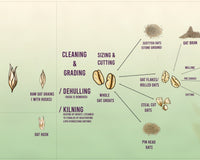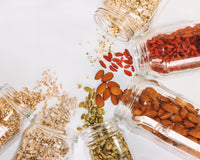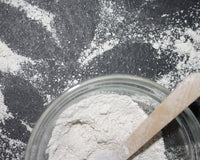We all know fresh fruits are generally good for you and absolutely delicious - they are natures candy after all! However, what about their dried counterparts, are they still healthy for you?
Read on to find out if adding dried fruits to your diet would be fruitful, or fruitless?
What is Dried Fruit?
Dried fruits have been around a long time, they’ve been a staple of Mediterranean diets for thousands of years. In fact, the earliest recorded reference of dried fruits dates all the way back to the Mesopotamian Era which is approx. 1500 BC
Today dried fruits are produced and eaten all over the world, the most common variety being raisins. Other popular varieties include dates, prunes, figs, apricots, peaches, apples, and pears. However, most fruits can be turned into dried fruits. So, whatever your favourite fruit is, there’s bound to be a dried version to suit your fancy.
The process of making dried fruits is quite simple, it requires removing the majority of water content from fresh fruit. The water is extracted either naturally, through sun drying, or by special dryers and dehydrators. Fruits can be dried either as a whole, in halves or as slices. They usually shrink down during this process leaving a tasty, energy filled food source!
Fresh Fruit vs Dried Fruit
You may think that when it comes down to it that fresh fruit is always better, and it some cases that may be correct. Dried fruits are higher in sugar than fresh fruits and the calorie content is also higher due to the loss of water. So, if you are watching you sugar intake or looking to lose weight, it is suggested to keep an eye on the portion size.
Despite this, dried fruits still retain most of the nutritional value of fresh fruits. As dried fruit contains a reduction in water it is therefore a much more concentrated source of nutrients. This means they tend to be higher in most vitamins and minerals per 100g when compared to their fresh counterparts.
Some additional benefits are that dried fruit have a longer shelf life and can be preserved for much longer than fresh fruit. Dried fruits should be stored in cool, dry, dark areas. In these conditions they can last up to a year. This makes them a handy snack to have to hand, particularly on a long trip where refrigeration is not easily available.
Also, a 30g portion of dried fruit still counts as one of your 5 a day!
Is Dried Fruit Healthy?
In moderation, dried fruits can be a healthy and nutritious option to include to your diet. They are high in fibre and packed full of antioxidants as well as beneficial vitamins and minerals.
Dried fruit can help improve your digestive health. It has prebiotic fibre which aids the healthy bacteria to keep the digestive tract working. Prunes especially, are a well-known natural laxative and may help improve constipation symptoms. This is caused by their high fibre content along with sorbitol, which is found naturally in some types of fruit.
One serving of mixed dried fruits, or dried apricots in particular, are a rich source of potassium. Our bodies do not naturally produce potassium, so it is important to include it in your food and drink consumption. Potassium is an important mineral that helps assist with many of the body’s essential functions such as blood pressure, water balance and your hearts rhythm.
Both dates and raisins have a low to medium glycaemic index value, along with a low insulin index. This means that neither of these types of dried fruit should cause extreme spikes in insulin levels or blood sugar after eating them. This in turn should lead to an increase of feeling fuller for longer, and a reduced risk of developing type 2 diabetes.
Just be aware that some dried fruit is coated with sugar or syrup to make it more ‘appealing’ and sweeter. This can also be referred to as ‘candied fruit’. It is important to always check the packaging when purchasing dried fruit if you wish to avoid any unnecessary added sugar and reap the most health benefits.
Adding Dried Fruit to Your Diet
You can find many types of dried fruits readily available at most supermarkets and whole food shops. In fact, we have a wide variety of dried fruits right here at Wholefood Earth. Dried fruit can also be made easily at home by using a microwave or an oven. We recommend spraying them a few times with lemon juice before drying if you want to stop any browning and discoloration.
This makes dried fruit a quick and simple addition to pretty much any balanced diet. You can eat them either as a tasty on the go snack, or incorporate them into any dishes you might want to sweeten up.
Raisins can be added with any nuts you have to make your very own homemade trail mix. They can also be included when making a variety of cakes or cookies. Most dried fruits make a nice addition sprinkled over porridge, cereal, or yoghurts. They can even work with savoury dishes too, for example mixed into a salad, couscous, or stir-fry. The possibilities are endless!
All in all, it seems including dried fruit to healthy, balanced diet is typically good for you. As with many foods, it is best eaten in moderation, and suggested to avoid any added sugars or syrups if you want the most wholesome option. We hope you have found this article a fruitful read 😉






